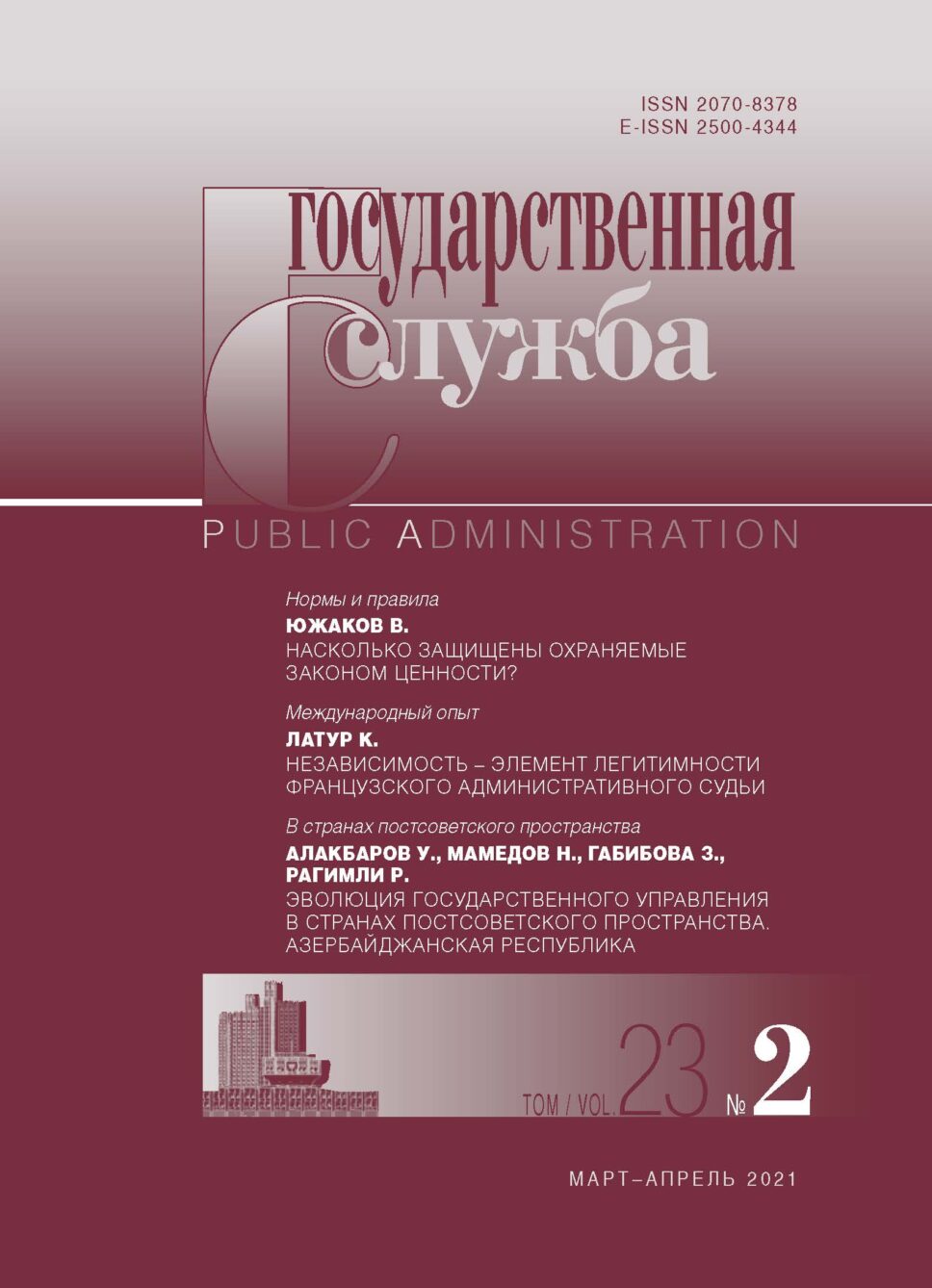Recommended link to article:
MIKHAIL VLADIMIROVICH DEGTYAREVа
DOI: 10.22394/2070-8378-2021-23-2-16-23
Abstract:
In connection with the adoption of the Federal Law of July 31, 2020 No. 258-FZ “On Experimental Legal Regimes in the Field of Digital Innovations in the Russian Federation” and of the Federal Law of July 31, 2020 No. 247-FZ “On Mandatory Requirements in the Russian Federation” (Article 13 “Experimental legal regime”) the topic of experimental legislation was updated. The article is devoted to the application of the experimental approach in legal regulation. The author reveals the essence of the concept of experimental legislation, explains the goals and objectives of using the appropriate technologies. The author notes that although in a broad sense it can be said that the adoption of any new law is in itself an experiment, there are still significant differences within the experimental law. The author sets out the essential features of a legislative experiment. The article examines the reasons for the need and prerequisites for the rationality of the use of experimental legislation. The author shows the nature of legislative experimentation and the merits of this toolkit. The author shows the areas of relevant application of the method of experimental legislation. The species diversity of methods of experimental regulatory regulation is indicated. The article compares the method of practical experimental legislation and the method of thought experiment in norm-writing and lawmaking activities. The article compares the method of practical experimental legislation and the method of digital duplicate-models of legislative acts. The author substantiates the existence of limits of applicability of the method of experimental legislation and demonstrates selected technologies of experimental legislation. In conclusion, the author turns to the complex and controversial problems of using the method of experimental legislation.
Keywords:
legislative activity, regulatory technologies, experimental legal regime, experimental legislation, theory of law, administrative law
Received:
March 26, 2021
References:
Beckstrom H.J. Transplantation of Legal System: An Early Report on the Reception of Western Laws in Ethiopia. The American Journal of Comparative Law. 1973. Vol. 21. № 3. P. 557–583.
Buzzoni M. Empirical Thought Experiments: A TranscendentalOperational View. Epistemologia. 2010. Vol. 33. № 1. P. 5–26.
Campbell D.T. Reforms as experiments. American Psychologist. 1969. Vol. 24. № 4. P. 409–429.
Doménech Pascual G. Los experimentos jurídicos. Revista de Administración Pública. 2004. № 164. P. 145–187.
Doménech Pascual G. Thought experiments in law. https://www. academia.edu/45007177/Thought_experiments_in_law
Évaluation législative et lois expérimentales [Законодательная оценка и экспериментальные законы]: Séminaire en Valais (Crans-sur-Sierre, 7–9 octobre 1992) / Sous la dir. de CharlesAlbert Morand; préf. de Jean-Louis Bergel / Université de droit, d’économie et des sciences d’Aix-Marseille, Faculté de Droit et de Science Politique. Aix-en-Provence: Press Universitaires d’AixMarseille, 1993.
Gamaleu Kameni C. Réflexions sur la méthode expérimentale dans la recherche juridique. Revue libre de Droit. 2015. P. 12–24.
Gardner J.A. The «States-as-Laboratories» Metaphor in State Constitutional Law. Valparaiso University Law Review. 1996. Vol. 30. P. 475–491.
Gestel, van R., Dijck, van G. Better Regulation through Experimental Legislation. European Public Law. 2011. Vol. 17. № 3. P. 539–553.
Horn H.-D. Experimentelle Gesetzgebung unter dem Grundgesetz. Berlin: Duncker & Humblot, 1989.
Howell J.M. States as economic laboratories. Society. 1982. Vol. 19. № 5. P. 58–62.
Khabrieva T.Ya., Chernogor N.N. The future of law. The legacy of academician V.S. Stepin and legal science. Moscow: INFRA-M, 2020. In Russian
Kupriyanovskiy V.P., Klimov A.A., Voropaev Yu.N. et al. Digital twins based on the development of BIM technologies, connected by ontologies, 5G, IoT and mixed reality for use in infrastructure projects and IFRABIM. International Journal of Open Information Technologies. 2020. Vol. 8. No. 3. P. 55–74. In Russian
Mader L. Evaluating the Effects: A Contribution to the Quality of Legislation. Statute Law Review. 2001. Vol. 22. № 2. P. 119–131.
Ponkin I.V. Deviantology of Public Administration: A Textbook. Moscow: INFRA-M, 2020. In Russian
Ponkin I.V. Defects of legal regulation. Pravo i obrazovanie. 2016. No. 7. P. 4–15. In Russian
Ponkin I.V., Kupriyanovskiy V.P., Ponkin D.I. Fintech, Regtech and regulatory sandboxes: concept, digital ontology, prospects. Sovremennye informatsionnye tekhnologii i IT-obrazovanie. 2020. Vol. 16. No. 1. P. 224–234. In Russian
Ponkin I.V., Lapteva A.I. Law and the digital: Machine-readable law, digital twin-models, digital formalization and digital onto-engineering in law: A Textbook. Moscow: Buki Vedi, 2021. In Russian
Ponkin I.V., Redkina A.I. Digital government: the digital twin-model (BIM) method in law. Gosudarstvennaya sluzhba. 2020. Vol. 22. No. 2. P. 64–69. In Russian
Popper K.R. La miseria del historicismo. Madrid: Alianza Editorial, 2006(a).
Popper K.R. La Sociedad Abierta y Sus Enemigos. Barcelona: Ediciones Paidós, 2006(b).
Primakov D.Ya. History of Jewish and Israeli law. Moscow: Infotropic Media, 2015. In Russian
Rubin E.L. Law and Legislation in the Administrative State. Columbia Law Review. 1989. Vol. 89. № 3. P. 369–426.
Sparer M.S. States as Policy Laboratories: The Politics of State-Based Single-Payer Proposals. American Journal of Public Health. 2019. Vol. 109 (11). P. 1511–1514.
黎娟 试验性立法”的理论建构与实证分析. 政治与法律. 2017. № 7. http://www.iolaw.org.cn/showNews.aspx?id=59301.
박영도. 실험법률에 관한 고찰. https://www.moleg.go.kr/mpbleg/ mpblegInfo.mo;jsessionid=SohPNRZ5B-Uyhhpcu2MIa59b.mo_ usr20?mid=a10402020000&mpb_leg_pst_seq=130398. 01.01.2009.
Articles in Open Access mode are published under the Creative Commons Attribution 4.0 International (CC BY) license.

